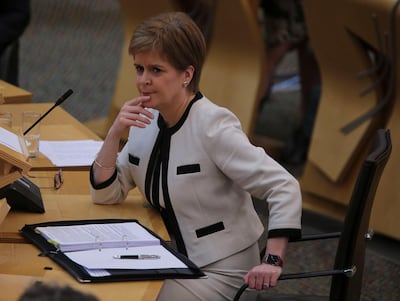A bitter dispute at the top of Scottish politics is boiling over weeks before crucial elections that could decide the future of the UK.
First Minister Nicola Sturgeon, one of the most recognisable contemporary political figures in the UK, has enjoyed soaring popularity during Brexit and the pandemic before Scotland's elections in May.
Yet Ms Sturgeon, who was elected on a platform of delivering Scottish independence from the UK, is embroiled in a major feud with her predecessor and former political mentor Alex Salmond.
Mr Salmond was last year acquitted by a Scottish court of sexually assaulting women during his time in office.
He previously won a judicial review when a judge ruled that the way Ms Sturgeon's government investigated the allegations against him had been unlawful.
Mr Salmond said the decision to pursue the case was part of a "deliberate, prolonged, malicious and concerted effort" to remove him from public life and even jail him.
Ms Sturgeon dismissed her predecessor's claims as "wild conspiracy theories".
The row dominating the political conversation in Edinburgh comes as support for breaking away from the rest UK is at its highest, with a recent Sunday Times poll finding 49 per cent would vote for independence if another referendum was held.
In the referendum in 2014, the “No” campaign won by a margin of 55 per cent to 45 per cent.
Strong support for Ms Sturgeon's Scottish National Party would undoubtedly increase pressure on UK Prime Minister Boris Johnson to hold another referendum on the issue.

The dispute will intensify on Friday when Mr Salmond faces questions from MSPs as part of the Scottish Parliament’s inquiry into the affair.
On Thursday, Ms Sturgeon said she had no regrets about ensuring complaints against Mr Salmond were investigated despite the difficulties the process caused her.
“For somebody in my position, somebody hearing what my predecessor, close colleague, friend of 30 years was accused of, the easier thing to do perhaps, perhaps the thing that in days gone by would have been done, was to sweep these complaints under the carpet and not to allow them to be properly investigated,” she told MSPs.
“I opted not to do that. And whatever difficulties have happened since then, whatever pain has been caused to lots of people in this process, I don’t regret not sweeping the complaints under the carpet, because that was the right thing to do.
“That may have led to difficulties, it has certainly made Alex Salmond very angry with me, that is self-evident. But that was the right thing to do.”
A chorus of Ms Sturgeon’s political rivals earlier said the controversy tarnished the reputation of Scotland's institutions, including its independent judiciary.
Ms Sturgeon is also alleged to have revealed the identity of one of the complainants to Mr Salmond’s former chief-of-staff, a claim she denies.
Scottish Conservative Holyrood leader Ruth Davidson said a there was “culture of secrets and cover-ups that is only growing and it is all taking place on Nicola Sturgeon’s watch”.
“Is saving your own skin worth all the damage that you are doing?” she asked.
Scottish Labour interim leader Jackie Baillie said the government failed the complainants.
“This is about the women, the women who were failed by the government’s botched handling of their complaints,” she said.

